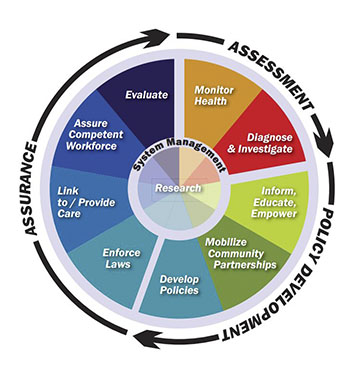Frequently Asked Questions
The measurement of our health departments performance against a set of nationally recognized, practice-focused and evidenced-based standards.
To improve and protect the health of the public by advancing the quality and performance of all health departments in the country – state, local, territorial and tribal.
The Public Health Accreditation Board (PHAB) is the national non-profit organization that administers the accreditation program for Tribal, state, local and territorial health departments in the United States. PHAB is located in Alexandria, VA.
- National recognition for public health practice
- Identifies public health strengths and areas for improvement
- Strengthens internal/external partnerships and relationships in our community
- Encourages health departments to prioritize and addressing long-standing concerns
- Incorporates continuous quality improvement and performance management into our daily practice
- Improves management processes
- Stimulates greater accountability and transparency within the health department to our community, stakeholders, and policy makers
- Documents the health department’s capacity to deliver the three core functions and 10 Essential Services of Public Health
- Credibility of the health department within the community
- Improves health department competitiveness for funding opportunities
- Increases communication with our governing entity
Program Managers/Coordinators may be selected to lead Domain Teams. If staff are selected to participate in the accreditation process they will be asked to assist Program Managers/Coordinators in the collection of materials, documents, etc. to demonstrate conformity with PHAB’s Standards and Measures.

The Ten Essential Services of Public Health – Where do you fit?
Listed below are the Three (3) Core Functions of Public Health and the 10 Essential Services, which are categorized under the applicable Core Function.
A. Assessment
1. Monitor health status to identify and solve community health problems.
2. Diagnose and investigate health problems and health hazards in the community.
B. Policy Development
3. Inform, educate, and empower people about health issues.
4. Mobilize community partnerships and action to identify and solve health problems.
C. Assurance
5. Develop policies and plans that support individual and community health efforts.
6. Enforce laws and regulations that protect health and ensure safety.
7. Link people to needed personal health services and assure the provision of health care when otherwise unavailable.
8. Assure competent public and personal health care workforce.
9. Evaluate effectiveness, accessibility, and quality of personal and population-based health services.
10. Research for new insights and innovative solutions to health problems.
Click on the sun or on one of the planets to watch it closer:
